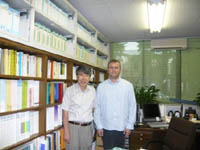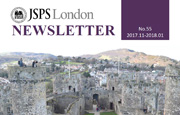JSPS Fellow's Experiences in Japan
Dr Petko Kusev
JSPS Summer Programme
Host Institution: Tokyo Institute of Technology and the University of Tokyo
(June 2008- August 2008)
Memory-Biased Preferences with Judgments and Decision Prospects.
Prospects Host Institutions and Researchers:
Professor Kazuo Shigemasu
The University of Tokyo
Department of Cognitive and Behavioral Science
Professor Kimihiko Yamagishi
Tokyo Institute of Technology
Graduate School of Decision Science and Technology
City University London
Department of Psychology
Northampton Square
EC1 0HB
UK
AIMS AND OBJECTIVES: The overall aim of the research was to develop further the theoretical model of accessibility of events in memory (Kusev et al., 2008) for judgments and decisions. Two objectives for the research were pursued in this
Project:
(1) Contribution to the psychology of risky decision-making, judgments and memory: We tested the generality of existing psychological theories of memory, judgments and decision making, in particular, the extent to which these theories can predict people�fs preferences. We found further evidence that high-accessible features in memory (e.g. samples of risk, frequencies of events) influence judgments and decisions, whereas features of low accessibility (e.g. abstract gambles and inaccessible real-world events) in memory are largely ignored.
(2) Research collaboration: The research has been conducted in collaboration with Professor Kazuo Shigemasu (expertise in psychology, Bayesian statistics and modeling of process of human decision making) and Professor Kimihiko Yamagishi (expertise in cognitive psychology, judgment and decision making). During my stay in Tokyo, I have been invited to give three talks and had the opportunity to establish a collaboration with Professor Takemura Kazuhisa - Waseda University Tokyo (Director of Centre for Decision Research) and Professor Noboru Hidano - Tokyo Institute of Technology (Economics Department). These international collaborations will allow further testing and modeling the generality of main theoretical concepts in memory, judgment and decision-making by using a combination of empirical methods including online experiments, laboratory and field studies.
Results:
In four computer-based experiments (80 participants from University of Tokyo, Tokyo Institute of Technology and Tama University) we human preferences. Across the experiments participants were asked to consider a presented scenario and choose one of two options (probabilistic or certain) in the abstract gamble or precautionary domains (Experiments 1, 2 and 3), and to recall/not recall events and make choices between options, and then also to make judgments of these options (Experiment 4). Relevant to our concerns here, we suggest that the accessibility of information in memory influences decisions (a) to chose or reject certain options - with high or low accessible features (b) to select or not select a particular precaution and (c) to predict uncertain events (e.g. baseball matches). We hypothesize that, similar to our previous findings, decisions with accessible features in memory differ from monetary gambles because the former cue accessible features in memory while the latter do not. Applying Prospect Theory and Support Theory to these data we find that (a) the weighting function required to model decisions with 'high-accessible' features in memory exhibits different properties to those required to model choices between monetary gambles and (b) the accessibility of events in memory affects choices between options, influencing participants' decisions, but not their judgments of these options. Instances of some risks are encountered in everyday life disproportionately frequently and the probability associated with highly accessible events in memory tends to be exaggerated. This result confirmed the failure of the descriptive invariance axiom of Expected Utility Theory (Kusev et al., 2008).






